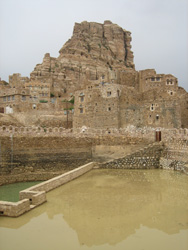You are here » Home » Telling Our Story
Success Story
Rejuvenating a mountain community’s traditional water supply
Mountain Town Gets Clean, Safe Water

| |
Photo: USAID
|
|
The renovated Jadaan Cistern is built of natural stone that protects the water supply.
A USAID environmental health program helped the community in the mountain village of Thula renovate a 700-year-old cistern using natural materials and traditional methods.
|
Like many mountain villages in Yemen, the town of Thula collects rainwater in cisterns to use for household water supply. This practice allows communities to make the best use of extremely scarce water resources. But rainwater can often become contaminated as it flows through collection channels into the cistern. Water stored in open cisterns can also become spoiled from animal waste, trash, or even dirt from the clothes, shoes, hands, and buckets of the people who come to fetch water from the cistern. Contaminated water is known to cause intestinal diseases that compromise health and can even be deadly for small children. Coming into direct contact with these contaminants while collecting water or swimming can cause skin rashes and possibly infections.
To help improve and protect the health of people living in the community of Thula, USAID sponsored the rehabilitation of the main cistern, the Jaadan Cistern. The plan to renovate the cistern carefully considered Thula’s historical and cultural importance; the renovators used mainly natural stone materials and a traditional method of plaster called qadad. The local contractor’s family had passed down the tradition of using qadad from generation to generation, and he is an expert in the special techniques needed for its proper application. The “new” cistern has a traditional filter system and five hand-pumps that will enable users to easily fetch water.
The cistern renovation is part of a series of community-based environmental health projects funded by USAID. The program was designed through consultations and focus groups with community and local council members in the district of Thula. In addition, the project conducted a survey of 269 households in 12 villages to understand local knowledge and practices related to water, sanitation, and hygiene. A locally elected project oversight committee comprised of five men and five women will work with the local council to raise awareness among community members, including children, on their role in keeping the cistern clean and assuring its maintenance.
Print-friendly version of this page (440kb - PDF)
Click here for high-res photo
Back to Top ^ | 

